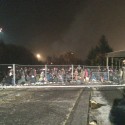Tag: immigration politics
-
Konferenz: Die Sahara – eine neue tödliche Außengrenze der EU? Externalisierung der Grenzen
Wann: 24.11.2018 – 10:00 Uhr Wo: Aquarium (neben Südblock) Skalitzer Str. 6 10999 Berlin English see below Die südliche Grenze der Europäischen Union bildet nicht mehr das Mittelmeer, sondern wurde mit Hilfe von Überwachungstechnik, Grenzzäunen und militärischen Checkpoints “externalisiert”, das heißt nach Nordafrika verlagert. Die neue südliche EU Außengrenze liegt in Libyen, Niger, Senegal, Algerien…
-
Invitation to a networking meeting to prepare protests – against the G20 Africa Partnership Conference – June 12th to 13th 2017 in Berlin
Time:Wednesday, 25th of January 2017, 7 pm Location: Aquarium (near Südblock) Skalitzer Str. 6, U8/U12 Kottbusser Tor german version bellow Our initiative has been working on a criticism of the so-called ‘EU Migration Management’ launched in 2015. African and Asian states are forced to control and prevent migration. The European countries are drawing borders in…
-
Join the commemorative Rally for the dead of the European Border Politics!
Friday, 18th December, at 3pm, in front of the European Commission, Unter den Linden 78 Call for action: Join the commemorative Rally for the dead of the European Border Politics next Friday at 3pm, in front of the European Commission, Unter den Linden 78!For the international Day of migration on the 18th December, we take our…
-
BOOK ABOUT DETENTION AND CONTROL
Border Watch: Cultures of Immigration, Detention and Control (Anthropology, Culture and Society) by Alexandra Hall (Pluto Press: London and New York, 2012). This book takes an inside look into detention centres and describes in detail everyday encounters between immigrant/detention officials and immigrants. Please click here for the review of this critical book.
-

Dobova lager (Croatian-Slovenian border)
[wpvideo PfLVMCzj] This video was taken in Dobova (Slovenia) a few days ago. This is not just a sole example of the mistreatment of the incoming people. The situations in camps change through days – sometimes they are empty and next day filled with new people arriving from Croatia. The situation at Šentilj/Spielfeld (Slovenian-Austrian border)…